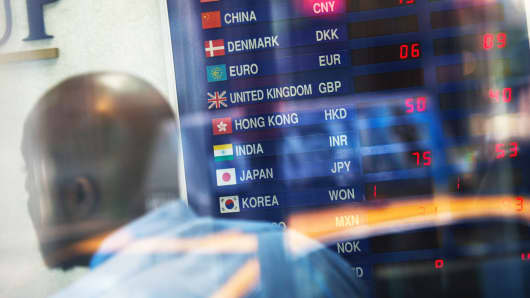The British pound has dropped in excess of 10 percent from its previous close in the New York market overnight. Traders, portfolio managers, hedgers, punters, and economists have all denounced the Brexit decision as a huge negative for the pound. Money managers throughout the world have sold billions and billions of pounds to limit their U.K. exposure. What happened?
The analogy I use with my clients is to consider how Texas voted secession from the United States between 1836-1845. Yes, Texas exited the United States as its own country and there is even a Texas embassy in London to prove it. Anyway, if Texas were to do the same today, they would have greater autonomy to decide their own fate and pick and choose the laws they wish to impose on the electorate. They would own immigration, taxes, the law, and most everything else that didn't require outside assistance. The U.K. just left their United States but it's called the European Union.
OK so now what? Who wins and who loses in the currency market now that so much uncertainty has been unleashed for months and years to come? In my view, the London Foreign Exchange (FX) banks, still suffering from the manipulation scandal, will bear the brunt of the Brexit vote as will their clients, while the trading exchanges, high frequency trading firms and Fintech will benefit.
Losers
FX banks in London traditionally did very well during periods of increased volatility. Today however, with regulations crimping the amount of risk they can run and increased capital costs applied to holding those risks, banks are less likely to garner outsized gains. In an environment of increased volatility, banks tended to eventually widen their spreads and capture more profits. Today, with non-banks providing an ever-increasing amount of liquidity to the market, banks will find it tougher to pass their costs onto their clients.
End-users will also suffer, as wider spreads due to a larger risk premium in the market will make hedging and trading more costly. They will chose to forego hedging in the face of increased volatility (costs) thereby increasing their risks. The fallout is that doing business in British pounds will become more costly. Period.
Winners
Fifty-two percent of the U.K. voting population won today. Other winners will be the centrally cleared exchanges where currencies are traded. They will see more business as counterparty risk will be re-priced higher after the vote. Also, high frequency trading firms will undoubtedly benefit. These are firms that utilize computers to quickly scalp small price differentials or exploit changes in currency correlations over thousands of transactions an hour. They are typically winners in higher volatility periods and these firms have stepped into the currency market where the banks have retreated.
Additional winners after today's U.K. vote will be the fintech companies that figure out how to develop, implement and manage a distributed ledger technology (DLT) that will quickly reduce counterparty risk, margin requirements, and settlement in the roughly $5 trillion a day FX market. As these technologies come to market, they should be in a position to attract new entrants with lower transaction costs, increased transparency, and ultimately bringing increased liquidity to the market.
The currency market in the U.K. flourished for decades with liquidity on tap 24 hours a day with little to no regulatory oversight. With the result of the Brexit vote I'm afraid this trend will be reversed and the London market will undergo a period of lower risk tolerances from liquidity providers and increased costs which will bring forward the shuttering of loss making 3rd tier FX banks that can no longer afford to operate in such an operational unknown.


